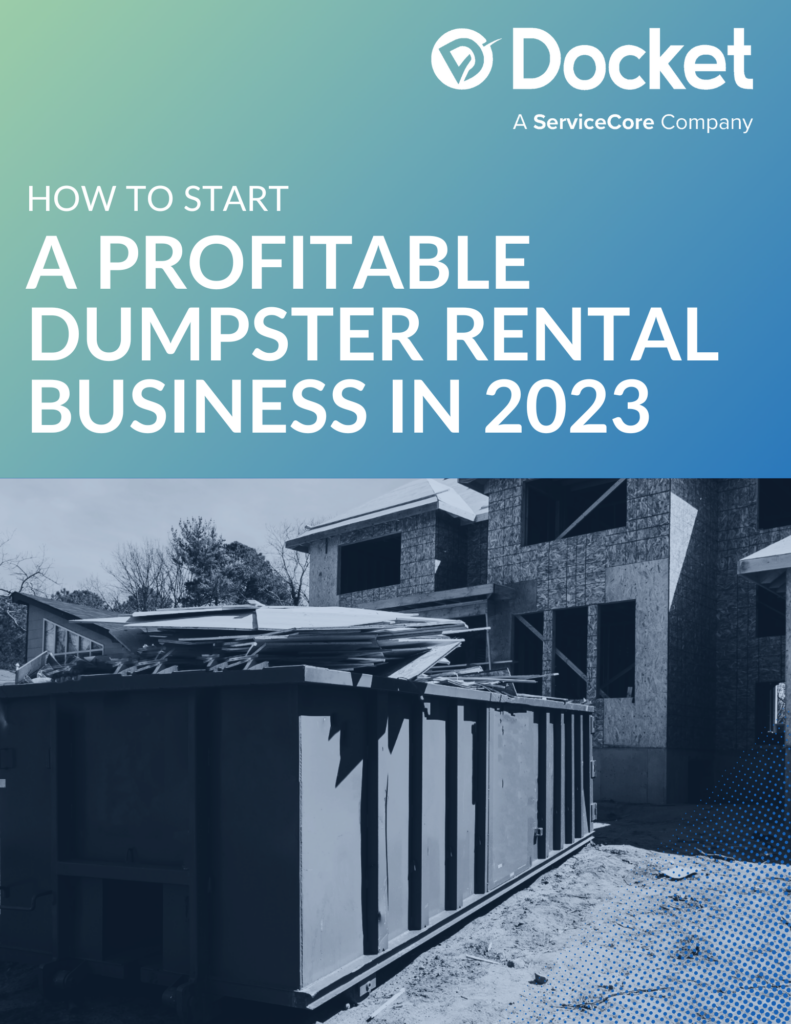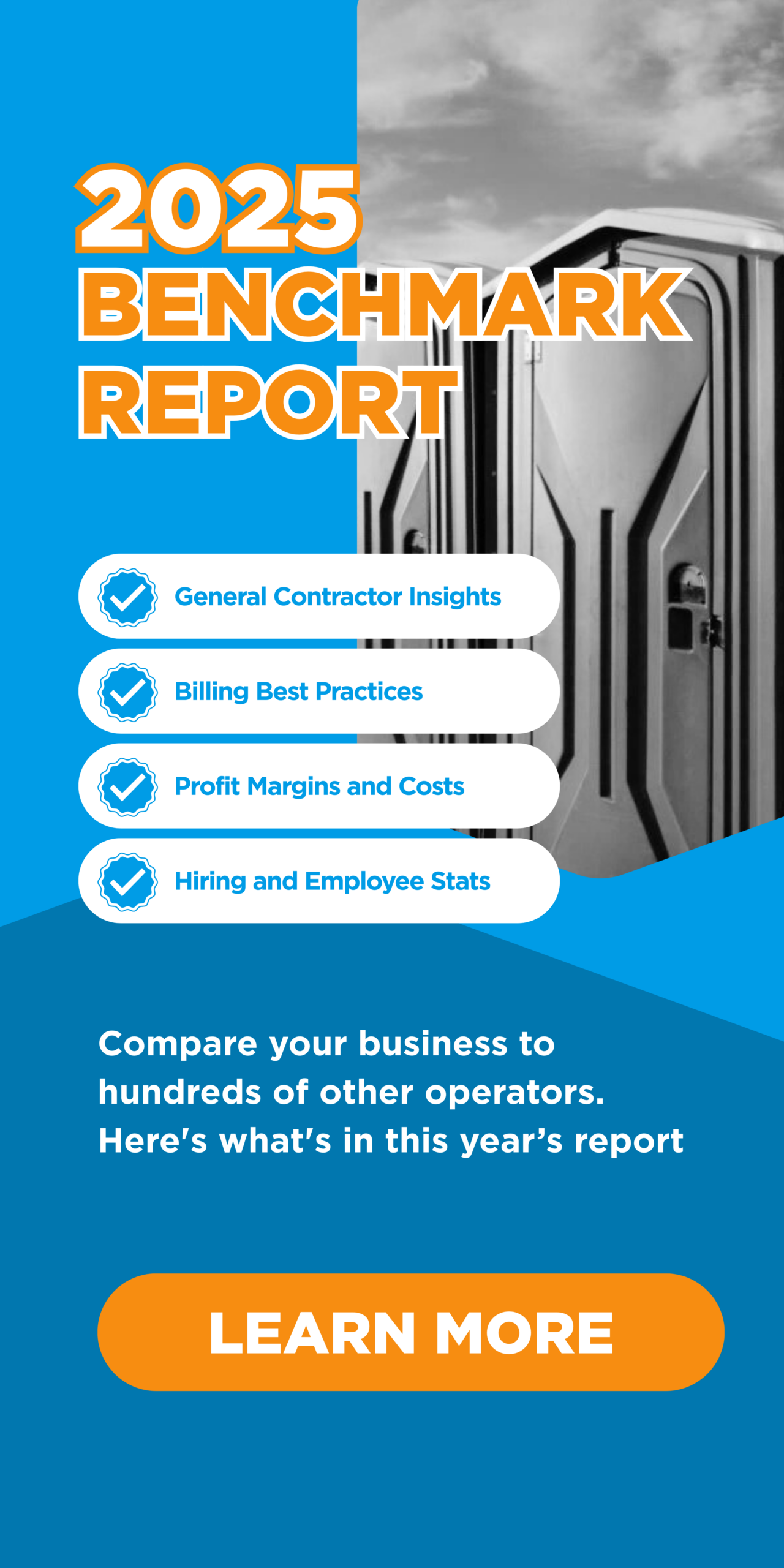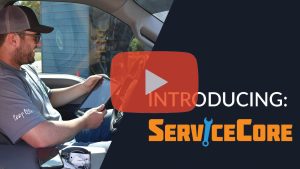All About Roll-Off Dumpsters: Your Complete FAQ
Welcome! This guide is for anyone who owns a roll-off dumpster business, works in one, or is thinking about using one. We’ll answer common questions and give you tips to make your business or customer experience better.
We’re ServiceCore, the team behind Docket, a trusted software solution that dumpster companies have relied on for years. We know the ins and outs of the roll-off dumpster business, and we’re all about making your life easier. Our experience gives us the knowledge to offer you real solutions that work. We’re committed to sharing valuable knowledge to help roll-off dumpster companies like yours succeed.
How do you Start a Dumpster Rental Business?
Starting a dumpster rental business can be profitable if done right. Here’s a step-by-step guide to help you get started:
Step 1: Research and Planning
- What to Do: Research the market to identify demand, competition, and potential customers. Create a business plan outlining your strategy, costs, revenue projections, and marketing plans.
- Why It’s Important: Knowing your market will help you make informed decisions and attract investors or loans if needed.
Step 2: Legal Requirements
- What to Do: Register your business, get a federal EIN, and meet any state or local licensing requirements. You’ll also need to understand and comply with waste management regulations.
- Why It’s Important: Operating legally protects you from fines and legal issues down the line.
Step 3: Financing
- What to Do: Calculate your startup costs, which will include the cost of dumpsters, trucks, and other equipment. Secure financing through loans, investors, or personal savings.
- Why It’s Important: Adequate funding is crucial for purchasing initial inventory and covering operational costs.
Step 4: Find a Location
- What to Do: Choose a location that is easily accessible and follows local zoning laws.
- Why It’s Important: A good location can make operations more efficient and can be more convenient for customers.
Step 5: Purchase Equipment
- What to Do: Buy or lease roll-off dumpster trucks and dumpsters. Make sure they meet safety and environmental standards.
- Why It’s Important: Quality equipment is more reliable and less likely to incur maintenance costs.
Step 6: Hire Staff
- What to Do: Hire drivers with commercial driving licenses (CDLs) and other staff as needed. Train them in safety protocols and customer service.
- Why It’s Important: Skilled and trained staff are essential for safe and efficient operations.
Step 7: Set Pricing
- What to Do: Research competitors’ pricing and set your rates. Consider offering promotions or discounts to attract initial customers.
- Why It’s Important: Competitive pricing can attract more customers while still ensuring profitability.
Step 8: Marketing
- What to Do: Create a website, utilize social media, and consider traditional advertising methods like flyers or local newspapers. You can also reach out directly to contractors, real estate developers, or other businesses that may need your services.
- Why It’s Important: Effective marketing brings in customers and establishes your brand.
Step 9: Operations
- What to Do: Implement an efficient system for taking orders, scheduling deliveries and pickups, and invoicing. Software solutions can help manage these tasks. Docket is a great software for this, click here to learn more about Docket.
- Why It’s Important: Smooth operations lead to satisfied customers and repeat business.
Step 10: Review and Adjust
- What to Do: Regularly review your business performance. Update your business plan, adjust pricing, or introduce new services as needed.
- Why It’s Important: A business needs to adapt to market changes and customer feedback for long-term success.
Starting a dumpster rental business involves multiple steps, from planning and securing financing to operations and marketing. Each step is important for the success of your business. Good luck!
If you want to learn more about starting a dumpster rental business, you can download this e-book.
What Do I Need to Start a Dumpster Rental Business?
When it comes to starting a dumpster rental business, having the right equipment is crucial. Here’s what you’ll need:
- Dumpsters: The core of your business. You’ll need various sizes to accommodate different customer needs, such as 10, 20, and 30 cubic yard dumpsters.
- Roll-Off Trucks: These specialized trucks are used to deliver and pick up dumpsters. They come with a hydraulic system to roll the dumpsters on and off the truck.
- Lifting Gear: Equipment like chains and hooks will be needed to safely lift and place the dumpsters.
- Safety Gear: This includes items like gloves, safety vests, and helmets for your employees to ensure their safety while handling the dumpsters.
- Maintenance Tools: Basic tools for minor repairs and maintenance of your dumpsters and trucks, such as welding equipment, hammers, and wrenches.
- Cleaning Supplies: High-pressure washers, brooms, and disinfectants to clean the dumpsters between rentals.
- Yard Space: A secure location where you can store your dumpsters and trucks when they’re not in use.
- Software: Last but not least, you’ll need specialized software like Docket to manage bookings, scheduling, invoicing, and customer communication. Software can help automate many aspects of the business, making it easier to manage and more profitable. Click here to visit Docket’s website and learn more.
Dumpster Dudez, a franchise operating across 11 states, faced challenges with manual tracking and invoicing. After switching to Docket, they experienced a significant boost in productivity. Joan Kelly, the Operations Manager at their Berks County branch, said, “Docket’s support team is always ready to help,” making the transition smooth and hassle-free. The software improved their invoicing, scheduling, and even helped them navigate through challenging times like natural disasters. Read the full case study here.
Investing in quality equipment and software from the start will set your dumpster rental business up for success. Make sure to do your research and get the best you can afford.
How can I effectively market my roll-off dumpster rental business?
Marketing your roll-off dumpster rental business is key to its success. One of the first steps is to establish a strong local presence. You can do this through local advertising like community boards, local newspapers, and even local events. This not only helps you get the word out but also builds a sense of community involvement.
Another important idea is your online presence. A user-friendly, up-to-date website can make a huge difference. It’s also important to interact with potential and current customers through social media platforms. This online engagement can be improved by making your website work better for search engines, commonly known as SEO. This ensures that when someone searches for “roll-off dumpster near me,” your business shows up in the results.
Customer reviews can also serve as a powerful marketing tool. Encourage your satisfied customers to leave positive reviews on various online platforms. This not only builds trust but also helps new customers find you more easily.
Offering promotions and discounts can attract first-time customers and can be especially effective when you’re trying to fill in gaps in your rental schedule.
Lastly, don’t underestimate the power of networking. Building strong relationships with local businesses that might need your services, such as construction companies or event planners, can bring in consistent business and help you grow in the long term.
What Can I Post on Social Media for My Dumpster Business?
Social media is a powerful tool for promoting your dumpster rental business. Here are some ideas for what you can post to engage your audience and attract new customers:
- Before and After Photos: Show the transformation of a space before and after using your dumpster service. This can visually demonstrate the value you offer.
- Customer Testimonials: Share quotes or video testimonials from satisfied customers. Personal stories can make your service more relatable and trustworthy. Here is an example of a testimonial from our social media.
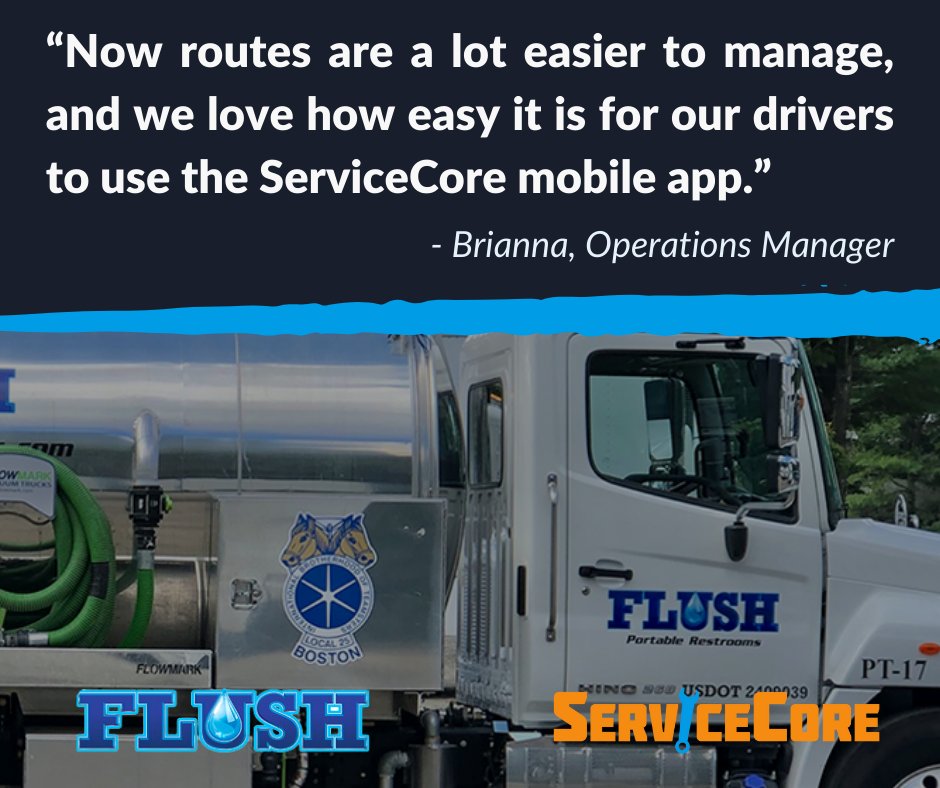
- Special Offers: Announce discounts, promotions, or special packages. Make sure to include an expiration date to create a sense of urgency.
- Educational Content: Share tips on waste management, recycling, or how to choose the right dumpster size. This positions you as an expert in the field.
- Behind-the-Scenes: Show your team in action, whether they’re delivering a dumpster or sorting materials for recycling. This humanizes your business and shows the hard work that goes into the service.
- Local Community: Post about local events you’re participating in or sponsoring. This shows that you’re engaged with the community.
- FAQs: Address common questions you get from customers in a simple and straightforward manner. This not only educates potential customers but also saves you time answering the same questions repeatedly.
- Seasonal Tips: Offer advice that’s relevant to the time of year, like spring cleaning tips or how to dispose of holiday waste.
- Safety Tips: Share best practices for safely loading and unloading dumpsters, or what not to put in a dumpster to avoid hazards.
By mixing up these types of posts, you can keep your social media feeds interesting and engaging, making it more likely that followers will turn into customers.
If you’re looking to network on social media with other dumpster rental business owners, join this Facebook group!
What should you consider when pricing roll-off dumpster rentals for businesses?
When it comes to pricing your roll-off dumpster rentals, several key factors come into play. Understanding these can help you set competitive yet profitable rates.
- Cost of Operations: The first thing to consider is your operational costs. This includes the cost of purchasing the dumpsters, maintenance, and fuel for the trucks. Knowing your costs will help you set a baseline price.
- Market Rates: Research what your competitors are charging. You don’t want to price yourself out of the market, but you also don’t want to undervalue your services.
- Customer Demand: If you’re in a high-demand area, you might be able to charge a bit more. However, be cautious not to price yourself out of reach for potential customers.
- Special Features or Services: If you offer something extra, like faster delivery times or specialized waste management, consider this in your pricing.
- Volume and Duration: Offering discounts for larger volumes or longer rental periods can attract bigger clients and ensure longer-term contracts.
So, start by calculating your operational costs. Then research competitor prices. Consider customer demand, especially if you’re in a high-demand area. If you offer any special features or services, those should also be reflected in the price. Finally, consider offering discounts for larger volumes or longer rental periods as a strategy to attract and keep customers. By balancing all these factors, you can come up with a pricing strategy that not only covers your costs but also makes your roll-off dumpster rental business look better to potential customers.
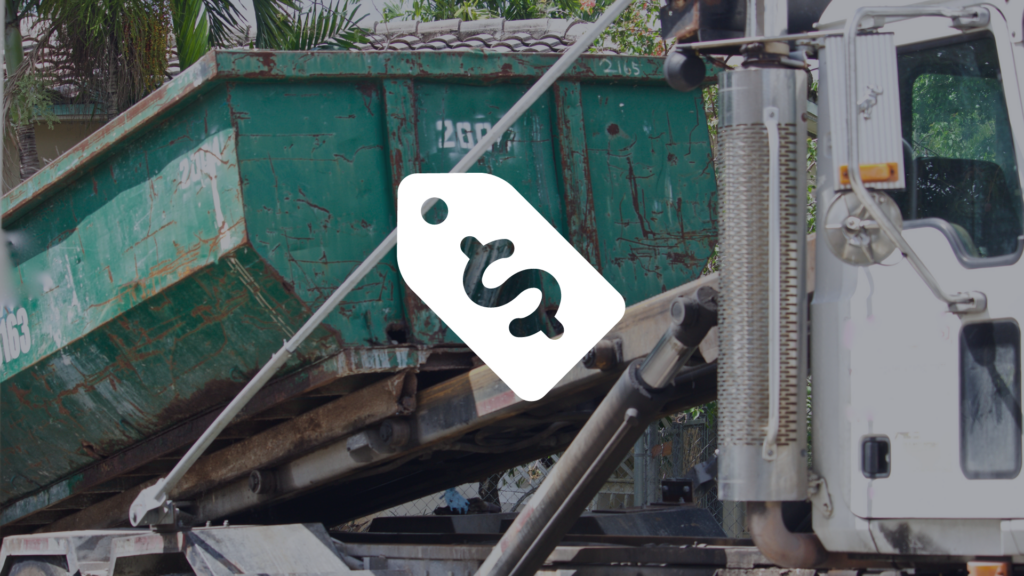
Want more information about pricing roll-off dumpsters, check out this article!
Should my dumpster rental business use software?
The short answer is yes, using software can make a big difference in how smoothly your dumpster rental business runs. Here’s why:
- Save Time: Software automates many tasks that you’d otherwise do manually. This frees up time for you and your team to focus on other important parts of the business, like customer service and growth.
- Stay Organized: Keeping track of dumpsters, client bookings, and payments can get messy. Software helps you keep all this information in one place, making it easier to manage.
- Better Communication: Software can send automatic updates to clients, like when a dumpster is on its way or when a job is complete. This keeps your clients in the loop and improves their experience with your service.
- Get Paid Faster: With features like online bill pay, you can speed up the payment process. This is good for cash flow and makes life easier for your clients too.
- Track Everything: Knowing where your dumpsters and trucks are at all times helps you run your business more efficiently. Software can offer real-time tracking for both.
- Grow Your Business: With the time you save and the better service you provide, you’ll be in a good position to grow your business. Software often comes with features that help you analyze your performance and plan for the future.
So, if you want to make your life easier, keep your clients happy, and set your business up for success, investing in specialized software like Docket is a smart move. Click here to learn more about Docket.
Real-World Success: King’s Roll-Off Service
Don’t just take our word for it; King’s Roll-Off Service, a dumpster rental business, significantly improved their operations after switching to Docket. They were able to streamline their billing process, save time and money, and even increase their profits. Angela, the operations manager at King’s Roll-Off Service, praised Docket’s customer support, saying, “Docket support is just unbelievable. They continually surprise you on how good their customer service is.” Read the full case study here.
What software should you use for a dumpster rental business?
If you’re in the dumpster rental industry, the software you should consider is Docket. Here’s some features that can help your business:
- Access from Anywhere: Manage your business operations in real-time from any location, keeping tabs on employees and assets.
- Automate Your Day: Streamline client communication with over 30 customizable email and text notifications from lead to job completion.
- Online Ordering and Bill Pay: Simplify the payment process by allowing clients to order and pay online, increasing your payment rates.
- Schedule and Dispatch: Easily assign and track tasks like drop-offs and pick-ups, improving operational efficiency.
- Employee and Asset Tracking: Know the real-time location of your employees and assets for better dispatching and time management.
- Estimates and Invoices: Quickly send out estimates and process invoices, speeding up your sales cycle and improving cash flow.
- Real-Time Billing: Monitor billing issues as they occur, allowing for quick resolution of uninvoiced jobs, weight overages, and more.
- Mobile App: Equip your field employees with a mobile app for managing daily tasks and timesheets, enhancing productivity.
Click here to get a demo with Docket and see how it can make your business more efficient. One company that uses Docket is King’s Roll-Off, which went from a paper operation to an efficient and modern one. According to the operations manager at King’s, “If you’re a dumpster rental company, big or small, Docket is a no-brainer.”
How much is a roll-off dumpster to buy?
You can expect to pay anywhere from $3,000 to $7,000 for a new roll-off dumpster, although high-end models can cost even more. Used dumpsters can be a more budget-friendly option, with prices ranging from $1,500 to $5,000 depending on their condition and features. Click here to join a Facebook group for dumpster rental companies where used dumpsters are sometimes sold.
Before making a purchase, it’s advisable to get quotes from multiple suppliers and consider the long-term costs, including maintenance and potential repairs. This will give you a comprehensive view of how much it will cost to own a roll-off dumpster and help you make an informed decision.
Where can you buy roll-off dumpsters?
When it comes to buying roll-off dumpsters, you have several options to consider, each with its own set of advantages and disadvantages.
Manufacturers: The most straightforward way to buy a new roll-off dumpster is directly from the manufacturer. Companies that specialize in waste management equipment often offer a range of sizes and features.
Distributors and Dealers: These are third-party sellers and they are authorized to sell products from various manufacturers. They often have a wide selection and can offer competitive pricing.
Online Retailers: Websites specializing in industrial equipment often list roll-off dumpsters. Make sure to check customer reviews and ratings before making a purchase.
Local Businesses: Sometimes local waste management or construction companies sell their used roll-off dumpsters. Keep an eye on local listings for these opportunities.
Facebook Groups: Believe it or not, social media can also be a good source for buying used roll-off dumpsters. There are specialized Facebook groups where business owners in the waste management industry list equipment for sale, including used roll-off dumpsters.
Auctions: Industrial auctions, both online and in-person, can be a place to find both new and used roll-off dumpsters at potentially lower prices.
Before making a purchase, do your research, compare prices, and consider the condition of the equipment if you’re buying used. Whether you’re looking for a brand-new model with all the latest features or a used one from a Facebook group, there’s always an option that fits your needs and budget.
What inventory management strategies work best for roll-off dumpster businesses?
Real-time tracking and categorization help in quick and effective decision-making. Scheduled maintenance and utilization analysis ensure that your equipment is always in top shape and used efficiently. Demand forecasting keeps you one step ahead in your inventory planning, while seasonal adjustments help you adapt to market fluctuations. Here are some details on those strategies:
- Real-Time Tracking: Use a real-time tracking system to know the status and location of each dumpster. This helps in quick decision-making and improves customer service.
- Categorization: Divide your inventory into categories based on size, type, or usage. This makes it easier to manage and organize your units.
- Scheduled Maintenance: Regularly schedule maintenance checks for your dumpsters to make sure they are in good condition. This reduces downtime and makes your dumpsters last longer.
- Demand Forecasting: Use historical data and market trends to predict future demand. This helps you plan your inventory needs better and avoid overstocking or understocking.
- Use Analysis: Regularly review how each dumpster is being used. If some dumpsters are always underused, consider selling them to optimize your inventory.
- Seasonal Adjustments: Some periods may have higher demand due to construction booms or seasonal cleanups. Adjust your inventory levels accordingly to meet the increased demand.
- Software: Use specialized software like Docket. This can keep track of your available units automatically and allow customers to book rentals more easily.
By using these strategies, you can keep control over your inventory, reduce costs, and improve service quality.
How much do roll-off dumpster drivers get paid?
The pay for roll-off dumpster drivers can vary based on several factors like location, experience, and the company they work for. Generally, you can expect between $15 to $30 an hour. However, here are some general guidelines:
- Hourly Wage: Many companies pay drivers by the hour. The hourly rate can range from $15 to $30, as mentioned above.
- Overtime: In busy seasons or during large projects, drivers might work extra hours. Overtime pay can boost earnings.
- Bonuses: Some companies offer performance bonuses, adding to your earning potential.
- Benefits: Health insurance, retirement plans, and paid time off are other perks that some companies offer, which can add to the overall compensation package.
So, if you’re thinking about becoming a roll-off dumpster driver or hiring one, expect the pay to differ. But generally, you’re looking at an hourly wage, with the chance for extra money through overtime and bonuses. Plus, some companies offer benefits like health insurance and retirement plans. All these can add up to make this job a solid earning opportunity.
How do you find roll-off dumpster driver jobs?
Finding a job as a roll-off dumpster driver doesn’t have to be hard. Here are some straightforward ways to go about it:
- Company Websites: The first place to look is the websites of companies that offer roll-off dumpster services. They often have a ‘Careers’ section where they list job openings.
- Job Boards: Websites like Indeed, Monster, and Glassdoor often list jobs for roll-off dumpster drivers. You can set up alerts to get notified when new jobs are posted.
- Networking: Word of mouth is powerful. Talk to people you know in the industry or related fields. They might know of job openings or can connect you with someone who does.
- Social Media: Platforms like Facebook and LinkedIn can be useful. There are groups dedicated to the waste management and trucking industries where jobs are often posted. Here is a group where you can network with roll-off dumpster businesses.
- Walk-Ins: Sometimes the old-fashioned way works best. If there are local companies you’re interested in, it might be worth it to walk in and ask if they’re hiring.
- Temp Agencies: Some companies hire through temp agencies that specialize in industrial or driving jobs. This can be a quick way to get your foot in the door.
So, whether you prefer searching online or hitting the pavement, there are plenty of ways to find roll-off dumpster driver jobs. Keep an eye on multiple sources and don’t hesitate to network. Your next job could be just around the corner!
How do you hire roll-off dumpster drivers?
Hiring the right roll-off dumpster drivers is important for the success of your business. Here’s a step-by-step guide on how to go about it:
- Job Posting: Start by creating a detailed job posting. List the responsibilities, qualifications, and any special requirements like a commercial driver’s license (CDL).
- Advertise: Put the word out through various channels. This could be your company website, job boards like Indeed, or even local newspapers. Don’t forget about social media and industry-specific groups. Here is a group where you can network with roll-off dumpster drivers or businesses.
- Applications: Collect resumes and applications for review. Look for candidates who meet your criteria and have relevant experience.
- Interviews: Shortlist candidates for interviews. This is your chance to assess their skills, attitude, and fit for your company culture.
- Background Checks: Before making an offer, conduct background checks to verify driving records, employment history, and any criminal records.
- Training: Once hired, provide comprehensive training. This should cover company policies, safety protocols, and the use of any specialized equipment.
- Probation Period: Consider starting new hires on a probation period. This gives both you and the driver time to assess if it’s a good fit.
- Ongoing Assessment: Regularly review performance, offer feedback, and provide opportunities for growth and development.
By following these steps, you can streamline your hiring process and increase your chances of finding the right drivers for your roll-off dumpster business. From advertising the job and conducting interviews to training and ongoing assessment, each step is important in building a reliable and skilled team.
We created a document with interview questions that you can ask a potential candidate. Click here to print it out.

How Do You Train Employees for a Dumpster Rental Business?
Training employees in a dumpster rental business is crucial for ensuring safety, efficiency, and customer satisfaction. Here’s how you can go about it:
- Orientation: Start with a general orientation to introduce new hires to your company’s mission, values, and the basics of the dumpster rental industry.
- Safety Training: The first and most important aspect is safety. Teach them the proper way to operate roll-off trucks, how to handle heavy equipment, and what safety gear to use. Make sure they understand the importance of safety checks before and after each job.
- Customer Service: Train your employees on how to interact with customers. This includes everything from how to answer the phone to dealing with customer complaints or questions.
- Software Training: If you’re using specialized software like Docket for scheduling, invoicing, and customer management, make sure your employees are well-versed in how to use it effectively.
- On-the-Job Training: Pair new hires with experienced employees for the first few weeks. This gives them a chance to learn the ropes and get hands-on experience.
- Waste Disposal: Educate them on the types of waste that can and cannot be disposed of in your dumpsters. Also, train them on how to sort recyclable materials if that’s a part of your business model.
- Equipment Maintenance: Teach basic maintenance checks for trucks and dumpsters to ensure they are in good condition. This can include checking tire pressure, fluid levels, and the condition of the dumpster itself.
- Legal Compliance: Make sure they understand the legal aspects, such as the necessary permits for placing dumpsters in certain locations and the regulations around waste disposal.
- Role-Playing: Use role-playing scenarios to train them on how to handle different situations they might encounter, like an angry customer or a safety hazard.
- Ongoing Training: The learning shouldn’t stop after the initial training period. Offer ongoing training sessions to update your team on new equipment, software updates, or industry regulations.
Well-trained employees are the backbone of a successful dumpster rental business. Investing in training will pay off in the form of safer operations, happier customers, and ultimately, a more profitable business.
How Can I Reduce High Turnover Rates for Dumpster Truck Drivers?
High turnover rates among truck drivers can be a significant pain point for dumpster rental companies. Constantly hiring and training new drivers can be both time-consuming and costly, affecting your bottom line.
Ways to Reduce High Turnover Rates:
- Competitive Pay and Benefits: Offering a competitive salary along with benefits like health insurance and retirement plans can make your company more attractive to potential employees.
- Work-Life Balance: Dumpster truck drivers often work long hours. Providing a balanced work schedule and respecting their time off can go a long way in retaining staff.
- Training and Development: Invest in training programs that not only teach the basics of the job but also offer opportunities for skill development and career growth.
- Open Communication: Create an environment where drivers feel comfortable sharing their concerns and feedback. Regular check-ins or surveys can provide valuable insights into what your drivers need.
- Recognition and Rewards: Recognize and reward good performance. Simple gestures like ‘Driver of the Month’ awards or bonuses for accident-free driving can boost morale.
- Safety Measures: Ensuring the safety of your drivers with well-maintained trucks and equipment can make the job less stressful, thereby increasing job satisfaction.
By focusing on these areas, you can improve job satisfaction among your drivers, reducing the likelihood that they’ll leave for other jobs. Lower turnover rates can lead to more experienced and efficient staff, ultimately benefiting your business.
How much can a dumpster rental business make?
The potential for profit in the dumpster rental business is significant. According to the video guide below, you could profit up to $500,000 in one year. Here’s a breakdown of how that’s possible:
- Profit Per Dumpster: The average price for a one-week dumpster rental is around $596. With a profit margin of about 40%, you’d make approximately $238.40 per dumpster per week after expenses like wages, fuel, and maintenance.
- Rental Frequency: While it’s unlikely you’ll rent out a dumpster every single week of the year, let’s say you manage to rent it out 90% of the time. That equates to about 47 weeks in a year.
- Annual Profit Per Dumpster: If you rent out a dumpster for 47 weeks at a profit of $238.40 per week, you’d make about $11,204.80 per dumpster per year.
- Number of Dumpsters for $500,000 Profit: To reach a profit of $500,000 in a year, you’d need to rent out about 45 dumpsters, each generating around $11,204.80 annually.
This video demonstrates the profit potential of roll-off dumpster businesses.
So, if you’re considering starting a dumpster rental business or looking to grow your existing one, the numbers show that it can be a highly profitable venture. Keep in mind that these are simplified calculations and actual profits can vary based on location, competition, and other factors. But even with these variables, the earning potential is clearly substantial.
How Do I Set Up a Waste Disposal Contract for My Dumpster Rental Business?
Setting up a waste disposal contract is a crucial step in running a dumpster rental business. A well-drafted contract protects both you and your clients, outlining the terms, conditions, and responsibilities for each party. Here’s how to go about it:
- Identify Your Needs: Before drafting a contract, identify what you’ll be offering. This includes the types of waste you’ll handle, the dumpster sizes available, rental durations, and any additional services like recycling.
- Consult Legal Advice: It’s highly recommended to consult with a legal advisor who has experience in waste management contracts. They can help ensure that your contract is compliant with local, state, and federal laws.
- Draft the Contract: Start by outlining the terms and conditions. This should include pricing, payment terms, weight limits, and the types of waste allowed in the dumpsters. Also, specify the responsibilities of both parties, such as delivery, pickup, and maintenance.
- Include Penalties: Clearly state the penalties for contract violations, such as overloading dumpsters or disposing of prohibited items. This sets the expectations right from the start.
- Permit and Regulation Clauses: Include clauses that explain the need for any permits, especially if the dumpster will be placed on public property. Also, outline who is responsible for obtaining these permits.
- Safety Protocols: Include a section that outlines the safety protocols to be followed during the delivery, rental period, and pickup of the dumpster.
- Termination Conditions: Specify the conditions under which the contract can be terminated by either party and any fees that may be associated with early termination.
- Review and Revise: Once the draft is ready, review it multiple times to make sure it covers all aspects of the service you’re offering. Make revisions as necessary.
- Client Review: Before finalizing, allow your client to review the contract and suggest any changes. This ensures that both parties are on the same page.
- Finalize and Sign: Once both parties agree on the terms, finalize the contract and get it signed. Keep copies for your records and provide one to the client.
By taking the time to set up a comprehensive waste disposal contract, you’re laying the groundwork for a successful, long-term relationship with your clients.
How Can I Improve the Fuel Efficiency of My Dumpster Rental Trucks?
Improving the fuel efficiency of your dumpster rental trucks can significantly reduce operational costs and increase your profit margins. Here are some practical ways to achieve better fuel efficiency:
- Regular Maintenance: Keeping your trucks in top condition is crucial. Regular oil changes, air filter replacements, and tire pressure checks can improve fuel efficiency.
- Driver Training: Educate your drivers on efficient driving habits. Quick acceleration and excessive idling can consume more fuel. Training programs can help drivers understand the best practices for fuel-efficient driving.
- Weight Management: Overloading trucks can significantly reduce fuel efficiency. Always adhere to the weight limits of your dumpsters and trucks to ensure optimal fuel usage.
- Fuel Monitoring: Implement a fuel monitoring system to keep track of fuel consumption. This data can help you identify patterns and make necessary adjustments.
- Regular Inspections: Conduct regular inspections to check for issues like fuel leaks, which can be both dangerous and wasteful.
- Upgrade Trucks: Older trucks are generally less fuel-efficient. If it’s financially feasible, consider upgrading to newer models that are designed with fuel efficiency in mind.
- Incentive Programs: Create incentive programs for drivers who meet or exceed fuel efficiency targets. This not only encourages responsible driving but also fosters a culture of efficiency within your company.
By implementing these strategies, you can improve the fuel efficiency of your dumpster rental trucks, leading to reduced costs and a more profitable business.
What Are the Tax Benefits and Deductions Available for a Dumpster Rental Business?
Understanding the tax benefits and deductions available can help you save money and make your dumpster rental business more profitable. Here’s a rundown of some key areas where you can save, be sure to consult a tax professional for specific deductions for your business:
- Vehicle Expenses: The cost of purchasing and maintaining your dumpster rental trucks can be a significant expense. You may be able to deduct these costs or even write off the depreciation of the vehicles over time.
- Equipment Costs: The purchase of dumpsters, lifts, and other equipment necessary for your business can often be deducted. Some businesses opt for a Section 179 deduction, which allows you to write off the entire cost of qualifying equipment in the year it was purchased.
- Operating Expenses: Day-to-day operating expenses like fuel, repairs, and maintenance for your trucks and dumpsters are generally deductible. Keep detailed records to maximize these deductions.
- Employee Wages and Benefits: Salaries, wages, and benefits paid to your employees, including health insurance, can be deductible expenses.
- Office Expenses: If you maintain an office, you can deduct the costs associated with it, including rent, utilities, and office supplies. If you run your business from home, you may qualify for a home office deduction.
- Marketing and Advertising: Costs incurred for marketing your dumpster rental business, such as website maintenance, online and offline advertising, and promotional materials, are usually deductible.
- Professional Services: Fees paid for professional services like accountants, lawyers, and consultants can be deducted. This also includes any software or services you use for business management, like route optimization or CRM software.
- Insurance: Business insurance premiums, including liability and property insurance, are generally deductible. If you offer health insurance to your employees, those costs are also deductible.
- Licenses and Permits: The costs of business licenses and permits required to operate your dumpster rental business are usually deductible.
- Retirement Contributions: Contributions to retirement plans for yourself and your employees can often be deducted, providing a dual benefit of saving for the future while reducing current tax liability.
- Green Energy Credits: If you invest in eco-friendly equipment or practices, you may be eligible for additional tax credits.
Consult a tax professional to ensure you’re taking advantage of all the tax benefits and deductions available to your dumpster rental business. Proper planning and documentation can result in significant savings.
How Can I Manage Seasonal Changes in Dumpster Rental Demand?
One of the biggest challenges for dumpster rental companies is dealing with seasonal changes in demand. During certain times of the year, like construction season or major holidays, you might find your dumpsters are constantly rented out. At other times, they might be sitting idle, costing you money.
Managing Seasonal Demand:
- Forecasting: Use past data to predict busy and slow periods. This will help you plan your inventory and staffing needs.
- Flexible Staffing: Consider hiring seasonal workers or using a flexible staffing model to meet increased demand without inflating your overheads during slow periods.
- Dynamic Pricing: Implement a dynamic pricing model where you can charge premium rates during high-demand periods and offer discounts during low-demand times.
- Marketing: Use targeted marketing campaigns to attract customers during slow periods. Offering special promotions or bundled services can entice customers to rent your dumpsters.
- Maintenance: Use the slow periods to perform necessary maintenance on your dumpsters and vehicles. This ensures you’re ready to go when demand picks up again.
By planning ahead and implementing these strategies, you can turn the challenge of seasonal changes into an opportunity for increased profitability.

How Do I Deal with Unreliable Payments from Customers?
One common pain point for dumpster rental companies is dealing with customers who are late on payments or fail to pay altogether. Unreliable payments can severely impact your cash flow and make it difficult to manage operational costs.
Strategies for Managing Unreliable Payments:
- Upfront Deposits: Require an upfront deposit before the dumpster is delivered. This not only secures the booking but also minimizes the risk of non-payment.
- Clear Payment Terms: Clearly outline payment terms in your rental agreement. Specify due dates, late fees, and the methods of payment you accept.
- Automated Reminders: Use software to send automated invoice reminders to customers. This can nudge them to make timely payments and reduce the administrative burden on your end.
- Payment Plans: For larger projects, consider offering payment plans. This can make it easier for customers to manage costs and increases the likelihood of you getting paid.
- Collections: Have a process in place for dealing with non-payments. This could range from sending formal demand letters to hiring a collections agency for extreme cases.
- Credit Checks: For long-term or high-value contracts, consider running a credit check on the customer to assess their ability to make payments.
By using these strategies, you can reduce the risks associated with unreliable payments and improve your company’s financial stability.
Questions from Customers
What is a roll-off dumpster?
A roll-off dumpster is a large, open-top waste container designed for handling a variety of materials like construction debris, household junk, and other waste types. Unlike regular dumpsters, which are often permanently located at a site, roll-off dumpsters are mobile. They are delivered and picked up by specialized trucks with a roll-off mechanism.
These dumpsters come in different sizes, typically ranging from 10 to 40 cubic yards, making them good for both small and large projects. The sides are usually low, making it easier to load heavy or bulky items. They are commonly used in construction sites, home renovation projects, and large-scale cleanups.
The roll-off dumpster is placed on your property and you can fill it up at your own pace. Once you’re done, the rental company picks it up and takes care of disposing of the waste, usually by taking it to a landfill or recycling center.
So, if you have a project that creates a lot of waste, a roll-off dumpster could be the most convenient way to manage it.
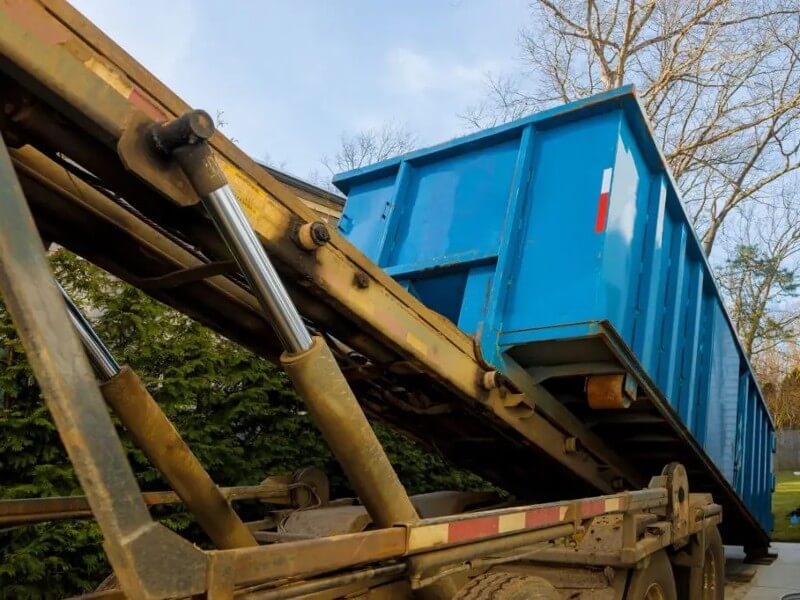
How much is a roll-off dumpster to rent?
The cost of renting a roll-off dumpster can vary widely depending on several factors. In general, you can expect to pay anywhere from $200 to $800 for a roll-off dumpster rental, but this range can go higher or lower based on this information:
- Size: Roll-off dumpsters come in various sizes, typically ranging from 10 to 40 cubic yards. The larger the dumpster, the higher the rental cost.
- Location: Prices can differ based on your location. Urban areas may have higher rental costs due to increased disposal fees and operational expenses.
- Rental Duration: The length of time you need the dumpster can also affect the price. Some companies offer daily, weekly, or monthly rates. Usually, companies offer different rates for short-term or long-term rentals which are longer than 30 days.
- Type of Waste: Some types of waste may require special handling or disposal methods, which could increase the cost.
- Additional Fees: Be aware of any additional fees that may apply, such as delivery charges, overage fees for exceeding weight limits, or specific disposal fees.
It’s always a good idea to get quotes from multiple providers to get a better understanding of the market rates in your area. By considering all these variables, you can find a roll-off dumpster that fits your needs and budget.
What can you put in a Dumpster Rental?
When you rent a dumpster, it’s important to know what you can and can’t throw in it. Here’s a general guide on what’s usually allowed:
- General Waste: Everyday items like trash, packaging, and non-recyclable materials are typically allowed.
- Construction Debris: Things like wood, metal, drywall, and other building materials are usually okay to toss in a dumpster.
- Yard Waste: Leaves, branches, and other organic materials from your yard can generally be disposed of in a dumpster.
- Furniture: Old furniture like sofas, chairs, and tables can often be thrown into a dumpster.
- Appliances: Some places allow you to dispose of appliances like fridges, ovens, and washing machines, but they might require you to remove hazardous components first.
- Electronics: Items like TVs, computers, and other electronics are sometimes allowed, but you may need to pay an extra fee for proper disposal.
It’s important to note that there are also items you usually can’t put in a dumpster:
- Hazardous waste like chemicals, paint, and batteries
- Tires
- Flammable materials
- Medical waste
Always check with your dumpster rental company for their specific rules, as they can differ. Breaking the rules can result in extra fees or even legal trouble, so it’s best to be sure.
How Far in Advance Should I Book a Dumpster Rental?
The timing for booking a dumpster rental can depend on several factors, but it’s generally a good idea to book one week in advance or before. Here’s what you should consider:
- Seasonal Demand: During busy seasons like spring and summer, dumpsters are in high demand for cleanouts and construction projects. If you’re planning a project during these times, it’s wise to book at least two to three weeks in advance.
- Project Timeline: If you have a specific start date for your project, aim to book the dumpster at least a week in advance to ensure availability and to accommodate any permits you may need.
- Permit Requirements: If you’ll be placing the dumpster on public property, you may need a permit from your city. The time it takes to obtain a permit can vary, so factor this into your planning.
- Company Availability: Some dumpster rental companies are busier than others. Popular companies may be booked weeks in advance, especially for specialized dumpsters.
- Flexibility: If your project dates are flexible, you might be able to book a dumpster with less notice. However, availability is not guaranteed, especially for specific dumpster sizes.
- Weekend or Holiday: If your project coincides with a weekend or holiday, book well in advance as these are high-demand periods.
- Special Requirements: If you have specific needs, like a dumpster with a certain weight limit or one that can handle specific materials, it’s best to book as early as possible to ensure those needs can be met.
In general, it’s better to book too early than too late. A little planning can go a long way in making sure you get the right dumpster when you need it. Planning ahead may also help you avoid additional fees and costs when ordering a roll-off dumpster.
How does dumpster rental work?
Renting a dumpster is a pretty straightforward process, but if you’ve never done it before, here’s how it generally works:
- Choose a Size: First, you’ll need to pick the right size dumpster for your project. They usually come in different sizes, measured in cubic yards, like 10, 20, or 30-yard dumpsters.
- Get a Quote: Once you know what size you need, contact a dumpster rental company to get a price quote. The cost will depend on the size, the type of waste you’ll be disposing of, and how long you’ll need the dumpster.
- Schedule Delivery: After you’ve agreed on the terms, you’ll set up a time for the dumpster to be delivered. Make sure you have a clear space for it to be placed.
- Fill it Up: Once the dumpster is delivered, you can start filling it with your waste. Be careful not to overfill it or put in items that aren’t allowed.
- Pick-Up: When you’re done, the rental company will come to pick up the dumpster. Some companies will automatically come on a set date, while others will wait for you to call them when you’re ready.
- Dispose of Waste: The rental company takes the dumpster back to their facility, where they sort and dispose of the waste according to local regulations.
- Final Payment: Depending on your agreement, you might make the final payment after the dumpster is picked up. This is when any additional fees for extra weight or restricted items would be added.
And that’s it! Renting a dumpster is a convenient way to get rid of large amounts of waste, whether you’re cleaning out your house, renovating, or need it for a work site. Just make sure to follow the rules set by the rental company to avoid any extra fees.
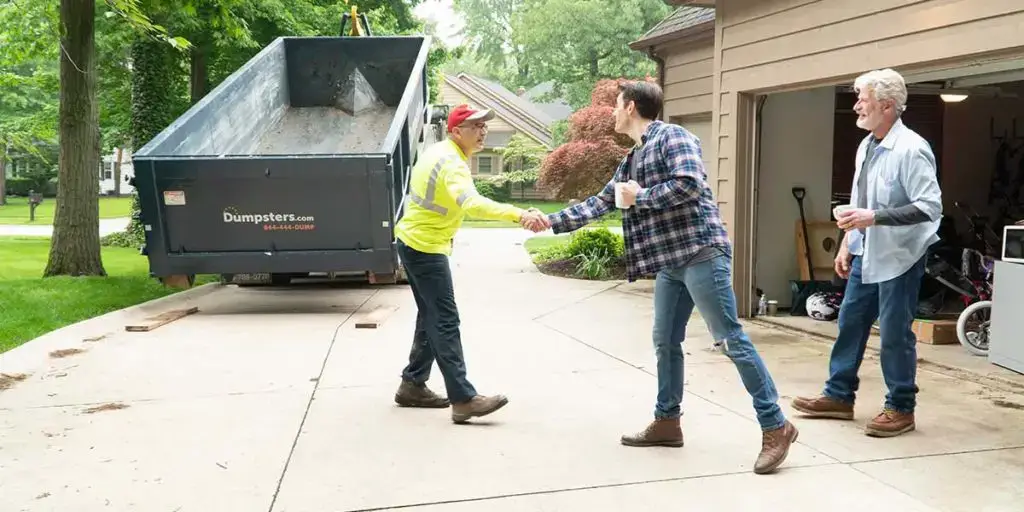
How long is a dumpster rental?
The length of a dumpster rental can vary depending on your needs and the policies of the rental company. However, here are some general guidelines:
- Short-Term Rentals: These are usually for quick projects and last for a week or less. This is often the minimum rental period for many companies.
- Standard Rentals: A typical rental period is about 7 to 10 days. This gives you enough time to complete most residential or small commercial projects.
- Extended Rentals: If you’re working on a larger project, you might need the dumpster for a few weeks or even a month. Some companies offer discounted rates for longer rental periods.
- Flexible Options: Many companies are flexible and allow you to extend the rental period if you find that you need more time. However, this usually comes with an additional daily or weekly fee.
- Scheduled Pick-Up: Some companies will automatically pick up the dumpster at the end of the agreed-upon rental period, while others will wait for you to call them when you’re ready for pick-up.
It’s always a good idea to discuss your project’s timeline with the rental company to find the best fit for your needs. Make sure to also ask about any fees for extending the rental period, so you’re not caught off guard.
What Are the Penalties for Overloading a Rented Dumpster?
Overloading a rented dumpster can lead to various issues, including safety hazards and additional costs. Here’s what you should know about the penalties involved:
- Extra Fees: Most dumpster rental companies have a weight limit for each dumpster size. Going over this limit usually results in additional fees, which can be quite costly.
- Safety Risks: An overloaded dumpster can be dangerous to transport. It poses a risk to the driver, other motorists, and even pedestrians. The rental company may refuse to pick up an overloaded dumpster until it’s been emptied to a safe level.
- Legal Consequences: Overloading a dumpster could violate local or state regulations, leading to potential fines or legal action against you.
- Delayed Projects: If your dumpster is too full for pickup, you’ll need to spend extra time removing the excess waste, which can delay your project timeline.
- Possible Rejection: In extreme cases, the rental company might refuse to collect the dumpster altogether until you’ve reduced the load to an acceptable level. This could result in you having to rent another dumpster, adding to your costs.
- Damage Costs: Overloading can also damage the dumpster or the roll-off truck, and you may be liable for the repair costs.
- Environmental Impact: Overloaded dumpsters can lead to spillage, which is not only a violation of environmental regulations but could also result in cleanup fees.
- Contract Violation: Your rental agreement will likely have terms related to overloading. Violating these terms could result in penalties or even termination of the rental contract.
To avoid these penalties, always be aware of the weight limit for your rented dumpster and monitor the amount of waste you’re disposing of. If you’re unsure about the weight, it’s better to stay on the side of caution and rent a larger size or schedule an additional pickup.
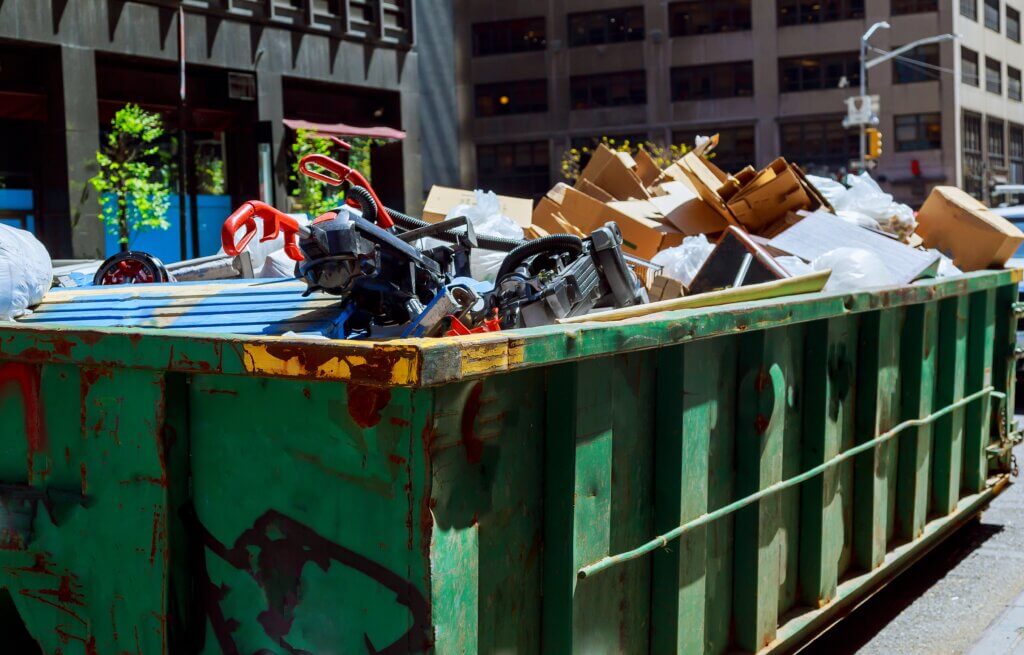
Conclusion
In the dumpster rental industry, having the right information and tools can make all the difference. Whether you’re a business owner looking to optimize your operations or a customer seeking the best rental options, this guide has got you covered. From understanding pricing and regulations to leveraging software like Docket for seamless management, the key to success lies in being well-informed and adaptable. So go ahead, take the insights you’ve gained here and apply them to your business or next project. Success is just a well-placed dumpster away.

